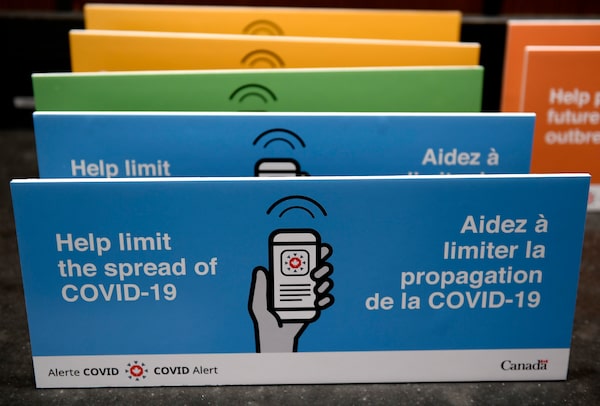
Ottawa is expected to announce the shutdown of the COVID Alert contact-tracing app this week, months after it was rendered useless in many provinces by testing changes.Justin Tang/The Canadian Press
Ottawa is planning to announce the shutdown of the national COVID-19 contact tracing app this week, months after changes to PCR testing regulations in many provinces had rendered it largely useless across much of Canada.
The app was hailed as a made-in-Canada tool to trace and contain the spread of COVID-19 in the early days of the pandemic. Using anonymous Bluetooth signals to track people’s close contacts, it allowed people who got a positive result on a PCR test to upload codes that would send exposure notifications to anyone who had spent more than 15 minutes near them.
Two sources familiar with the situation said they expect an announcement to be made about the shutdown this week. The Globe and Mail is not identifying the sources because they were not authorized to discuss the matter.
The federal government had always said that it would eventually wind down the app, although the original plan was to do it when the pandemic was declared to be over. In recent months, however, experts on government data usage and policy had been pushing for it to end because changes to PCR testing policies had significantly reduced its usefulness.
The COVID Alert app’s death has been a protracted one. By several metrics, it did not achieve what it was designed to do. Only 6.9 million of Canada’s 38 million residents had downloaded it by last February – which is when Ottawa stopped publishing usage numbers – and Canadians entered only 57,704 codes declaring they had COVID.
At that point, more than three million Canadians had contracted COVID-19 since the pandemic’s start; total infections are now approaching four million. Users often complained that exposure notices were sent in error; British Columbia, Alberta, Yukon and Nunavut opted against using the app altogether.
One of the federal government’s hand-picked advisers tasked with overseeing the app spent weeks quietly pushing Ottawa to decommission it. Brenda McPhail, who manages the Canadian Civil Liberties Association’s technology and privacy work, warned Ottawa that the app was ineffective and that not winding it down could pose a security risk to Canadians if it were left to wither on phones whose operating systems receive regular updates.
“The app was an extraordinary measure justified to the public by the national health crisis – its presence on our home screens should not be normalized and left unmonitored,” Dr. McPhail wrote in a letter in early May, a copy of which she shared with The Globe. The advisory council she sat on wound down a year ago.
Bianca Wylie, a long-time advocate for transparency in government on matters of digital decision-making, had in recent months warned that Ottawa had failed to responsibly wind down COVID Alert. The app’s failure demonstrated that governments should institute policy to keep them accountable when they take on these kinds of projects, she said in an interview.
“The goal was not a good tech deployment,” but rather to benefit public health, Ms. Wylie said. “Efficacy was never on the table. We don’t know what this did for [Canada’s] COVID response. … When it’s not working, you have to shut it down.”
The council of advisers that Dr. McPhail sat on was tasked not just with overseeing the app, its privacy consequences and its public-health outcomes, but also with its wind-down. Its members were dismissed last year after their initial one-year contracts lapsed, and two of the three reports that the federal government commissioned the council to write about the app’s effectiveness were never published. Dr. McPhail said she anticipates those reports will be released soon.
The federal privacy commissioner’s office conducted a review of COVID Alert at its launch and concluded that its privacy measures, including its encryption methods and its policy to delete codes declaring that a user was infected after 14 days, were satisfactory.
But Dr. McPhail warned in an interview on Monday that “there’s a risk that that kind of technology, if it’s sitting around, will end up being repurposed rather than uninstalled. … Not all the risks of surveillance are about privacy. But privacy is an important form of protection and mitigating risks of surveillance.”
The Canadian Press reported last year that Ottawa spent $20-million on the app, which was built by the Canadian Digital Service with assistance from other federal departments and the Ontario Digital Service.
Launched in July, 2020, COVID Alert was heralded as a significant achievement in contact tracing and as a strong example of public- and private-sector teamwork at a moment when virtual collaboration seemed new to many. It built on exposure-notification technology developed by Shopify Inc. volunteers, and had a security review done by BlackBerry Ltd.
Interest in the app dwindled through 2021 as public and government attention turned toward other tools for reducing COVID infections that were becoming more widely available: vaccines and rapid antigen tests. Yet the year’s end coincided with the rise of the highly transmissible Omicron variant, which prompted governments to shift reliance from government-backed PCR testing to the mass distribution of rapid antigen tests – the results of which are less accurate and are largely not collected by health authorities.
Health Canada declined to comment on Monday.
Your time is valuable. Have the Top Business Headlines newsletter conveniently delivered to your inbox in the morning or evening. Sign up today.
 Josh O’Kane
Josh O’Kane